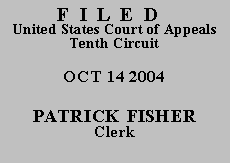 UNITED STATES COURT OF APPEALS
UNITED STATES COURT OF APPEALS
 UNITED STATES COURT OF APPEALS
UNITED STATES COURT OF APPEALS
| THOMAS RICHARD BARRON, |
|
| v. | |
| RON WARD, |
|
I. BACKGROUND
In August 2001, Mr. Barron pleaded guilty in Oklahoma state court to one count of possession of a controlled dangerous substance within 1,000 feet of a school and one count of manufacturing a controlled dangerous substance. Mr. Barron was sentenced to consecutive terms of twenty years' imprisonment for each count and fined $50,000. The trial court denied his motion to withdraw his plea in October 2001, and the Oklahoma Court of Criminal Appeals ("OCCA") later denied certiorari. In April 2002, Mr. Barron filed his § 2254 petition in federal district court. He alleged (1) involuntariness of his guilty plea in violation of the right to a fair trial under the Fifth, Sixth, Eighth and Fourteenth Amendments, (2) ineffective assistance of counsel in violation of the Sixth Amendment, and (3) erroneous denial of his motion to withdraw his guilty plea in violation of the Fifth, Sixth, Eighth and Fourteenth Amendments. Following the magistrate judge's recommendations, the district court denied Mr. Barron's § 2254 petition in April 2004. He now seeks a COA so he may appeal the district court's ruling on the same three grounds rejected by the district court.
II. DISCUSSION
We may issue a COA and entertain Mr. Barron's appeal only if he "has made a substantial showing of the denial of a constitutional right." 28 U.S.C. § 2253(c)(2). To make a substantial showing, Mr. Barron "must show that reasonable jurists could debate whether (or, for that matter, agree that) the petition should have been resolved in a different manner or that the issues presented were adequate to deserve encouragement to proceed further." Miller-El v. Cockrell, 537 U.S. 322, 336 (2003) (internal quotation marks omitted).
In addition, an Oklahoma state court has already adjudicated Mr. Barron's habeas claims on the merits. In cases like this, we may grant habeas relief only where the state court decision was "contrary to, or involved an unreasonable application of, clearly established Federal law, as determined by the Supreme Court" or was "based on an unreasonable determination of the facts in light of the evidence presented in the State court proceeding." 28 U.S.C. § 2254(d). We have also recently held that this "deferential treatment of state court decisions must be incorporated into our consideration of a habeas petitioner's request for COA." Dockins v. Hines, 374 F.3d 935, 938 (10th Cir. 2004).
Applying this deferential standard, we have reviewed the magistrate judge's report and recommendation, the district court's order and the entire record and brief on appeal. For substantially the same reasons set out in the magistrate judge's thorough report and recommendation, and the district court's order addressing objections to the report and recommendation, we conclude that Mr. Barron has not made a "substantial showing of the denial of a constitutional right" under 28 U.S.C. § 2253(c)(2). First, the OCCA did not unreasonably apply federal law when it ruled that the trial court sufficiently informed the petitioner of his sentencing range and that he adequately understood the consequences of his plea. Second, we conclude that the OCCA did not err when it found no "actual conflict," at the plea hearing or the hearing to withdraw Mr. Barron's plea of guilty, that adversely affected his counsel's performance. Finally, the trial court did not abuse its discretion when it did not allow the petitioner to withdraw his guilty plea.
We therefore DENY Mr. Barron's application for a COA. We GRANT his motion to proceed in forma pauperis and DISMISS the appeal.
Entered for the Court,
Robert H. Henry
Circuit Judge